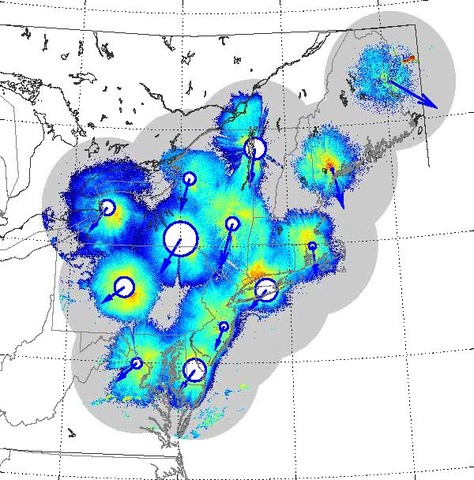Cross-disciplinary research round-up

Computer Science within UMass Amherst has changed from a school to the College of Information and Computer Sciences (CICS), but one of its strongest characteristics remains the same--the connectivity among its faculty and our commitment to productive research and teaching through collaborative and interdisciplinary work. This is evident in the latest research grants and research highlighted below.
For patients with HIV and other chronic conditions, taking medicines daily and exactly as prescribed is crucial for quality of life and long-term health. To support this, CICS Associate Professor Deepak Ganesan is teaming with Jenna Marquard, associate professor of mechanical and industrial engineering and CICS adjunct faculty, on a $1.71 million grant from the National Institutes of Health to develop a cost-effective, easy-to-use device for maintaining a medication regimen for HIV and other chronic conditions. They will work with the Swedish Medical Center in Seattle and the University of Washington to design and evaluate a wrist-worn device that detects when a person is interacting with the container and swallowing a pill.
"The challenge is to design a solution that is cost-effective, unobtrusive, and accurate so that it can be scaled easily," said Ganesan. "While there are many mobile phone and sensor-based solutions for medication adherence, they fall short of one or more of these goals. Some of them require expensive instruments on the pill bottles, others require manual input of information by a user, and most do not sense whether the pill was ingested or not." Marquard, whose research specializes in health informatics and human factors engineering, noted that the project is a design as well as a technology challenge. "The solution needs to fit seamlessly into patients' patterns of daily living," she explained. Marquard and Ganesan said that this project closely aligns with the goals of the UMass Institute of Applied Life Sciences (IALS) on the Amherst campus, which focuses on translating life science research into products that improve human health. As IALS Director Peter Reinhart, pointed out, "This is an exciting endeavor both because it addresses an important healthcare problem and because it is the type of interdisciplinary collaboration leading to real-world solutions that constitute the mission of the IALS Center for Personalized Health Monitoring."
In another multi-disciplinary initiative, CICS Assistant Professor Dan Sheldon is leading the CICS effort on a multi-institutional grant funded through the National Science Foundation's Expeditions in Computing Program. Cornell University is the lead on this $10 million Expeditions initiative, one of three funded this year. The CompSustNet project involves twelve partner institutions to explore computational sustainability. Along with UMass Amherst and Cornell, the partners include Bowdoin College, California Institute of Technology, Carnegie Mellon University, Georgia Institute of Technology, Howard University, Oregon State University, Princeton University, Stanford University, University of Southern California, and Vanderbilt University.
CompSustNet will act as a large national and international multi-institutional research and education network, collaborating with key governmental and non-governmental organizations in the areas of conservation, poverty mitigation, and renewable energy. "Our NSF Expedition brings together computer scientists and engineers, environmental and social scientists, physicists, and materials scientists charged with growing and expanding the horizons of the nascent field of computational sustainability," said Cornell PI Carla Gomes. "Advances in computational sustainability will lead, for example, to novel strategies to help herders and farmers in Africa improve their way of life, save endangered species, and scale renewables up to meet 21st century energy demand."
In another interdisciplinary project, CICS Professor Hava Siegelmann, along with Patrick Taylor, Nick Hobbs, and Javier Burroni, conducted research that links brain architecture to consciousness and abstract thought. Using 20 years of functional magnetic resonance imaging (fMRI) data from tens of thousands of brain imaging experiments, the team has created a geometry-based method for massive data analysis to reach a new understanding of how thought arises from brain structure. Their work appeared in the December issue of Nature Scientific Reports. The authors said their work paves the way for advances in the identification and treatment of brain disease as well as in deep learning artificial intelligence (AI) systems.
Siegelmann believes this work, supported by the Office of Naval Research, will have far-reaching effects. "Currently, many brain disorders lack a clear biological identifier, and are diagnosed by symptoms, such as confusion, memory loss, and depression. Our research suggests an entirely new method for analyzing brain abnormalities and is a source of new hope for developing biomarkers for more accurate and earlier diagnoses of psychiatric and neurological diseases."
Finally, CICS Professors Andrew McCallum and Beverly Woolf are participating in the NSF Big Data Hubs program, a nationwide network for data innovation. McCallum and Woolf co-organized the first Northeast Big Data Hub Workshop held at Columbia University, which drew over 100 leaders from a wide range of industries, government, and universities. Participants discussed issues ranging from national security to corporate data analytics, while also taking part in a breakout session focused on data available for sharing and plans for the coming year. Woolf is co-leader of the Northeast "Big Data in Education Spoke," a focus area within the Hub. McCallum is a member of the Northeast Hub's executive committee and a member of the "Discovery Science Spoke." CICS alum, Carla Brodley (Ph.D. '94) is also on the executive committee. CICS Professor David Jensen is a member of the "Finance Spoke," and CICS Professor Prashant Shenoy is a member of the "Energy Spoke." Though only in its first year, the Northeast Hub is already comprised of scholars from over 40 universities, governments, and non-profits in order to bring experts in the public and private sector together to collaborate on data-driven solutions in four theme areas: education, data sharing, ethics and policy, and privacy and security.